|
November 25, 2017 - No. 38
Supplement
One Year Since
the Loss
of Fidel Castro
Fidel's
Revolutionary Example
Inspires
Millions to Fight for Sovereignty
and Uphold Principle
PDF
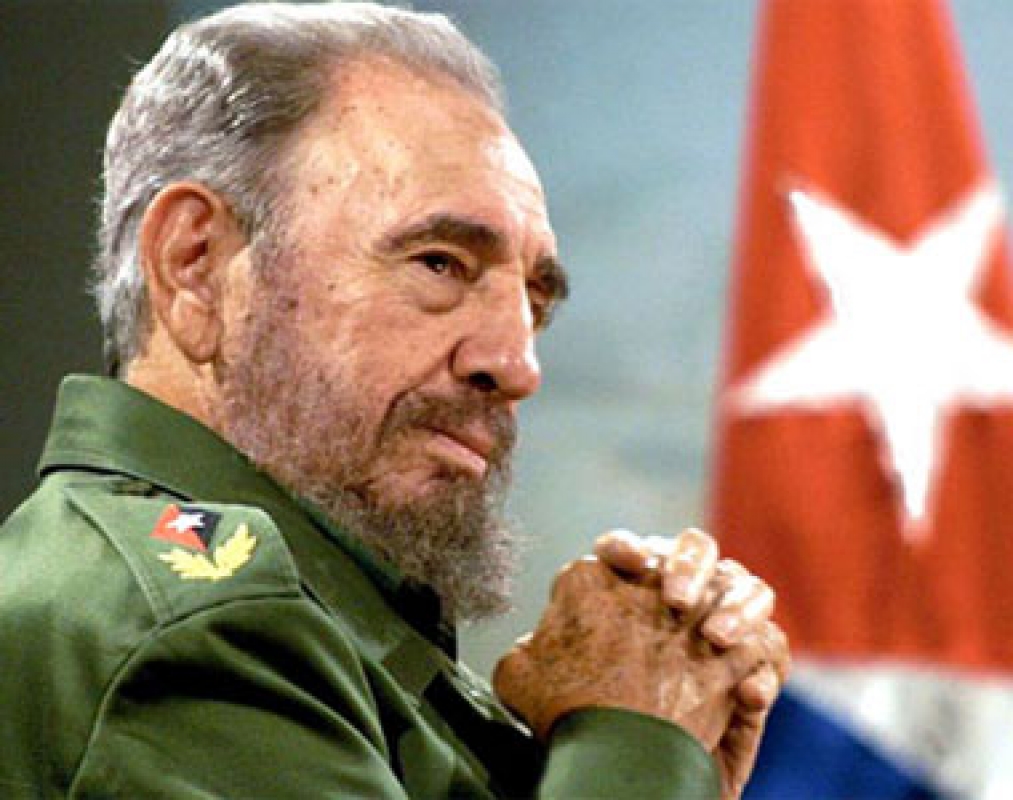
• ¡Fidel
Presente,
Siempre!
Fidel
Is
Ever
Present!
- Isaac Saney, Canadian Network on Cuba -
• Revolution Is...
- Yenia Silva Correa -
• Cuban
People Pay Homage to Fidel on Anniversary of His Death
• Fidel
Honoured in Washington
• Cuban Event on the
Thought of
Fidel Castro Held in Guantánamo
• Every Word a Concept,
an
Idea
- Marta Rojas Rodríguez -
• Fidel Launched Us into Battle
- Alejandra García -
• Always Fidel
- Ciro Pérez Hebra
-
One Year Since the Loss of Fidel Castro
Fidel's Revolutionary Example Inspires Millions to
Fight for
Sovereignty and Uphold Principle
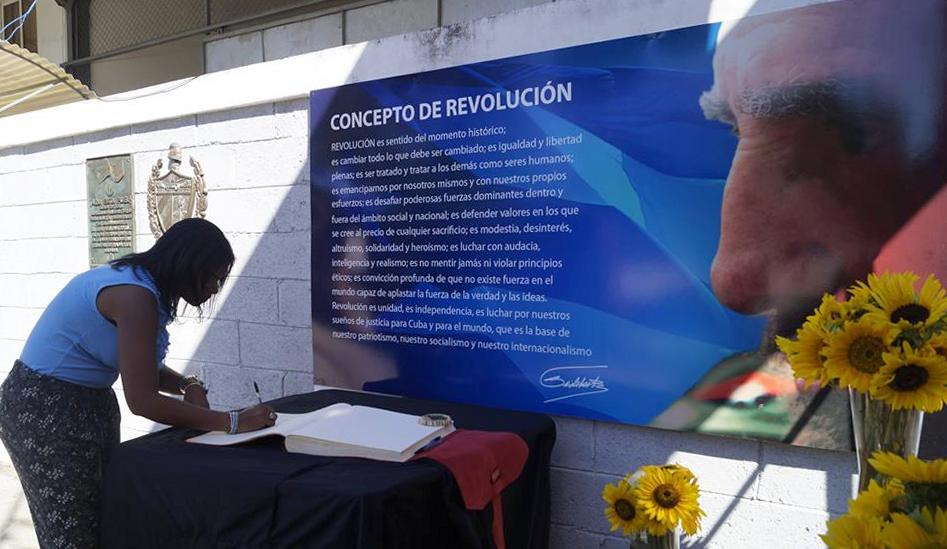
In a tribute to Fidel at the time of his death, millions of Cubans
sign
the oath
to the "Concept of Revolution" which concludes "Revolution means unity;
it is independence, it is fighting for our dreams of justice for Cuba
and for the world, which is the foundation of our patriotism,
our
socialism and our internationalism."
On November 25th we commemorate the first anniversary of
the physical loss of the historic and legendary leader of the Cuban
Revolution, Comrade Fidel Castro. During the past year, the Cuban
people have turned
their profound sadness at the loss of their beloved leader into greater
strength and unity in their fight to defend their independence and
sovereignty against imperialist interference. Facing natural disasters,
such as the recent hurricanes that have caused great destruction across
the island, and the increasingly brutal economic and financial blockade
of the U.S., Cubans are united in overcoming all difficulties and
safeguarding the revolution. Fidel's revolutionary spirit and profound
generosity lives on in the workers, youth and students, health
professionals, intellectuals and teachers who have proven that they are
ready to make any sacrifice and overcome any difficulty to continue
building the socialist economy so no one is left behind.
Fidel's example and fidelity to principle continue to
inspire
the Cuban people on the path of independence, self-determination
and human dignity. One year ago, millions of Cubans in tribute
to Fidel signed the oath to the "Concept of Revolution" which Fidel
declared on May 1, 2000. The oath concludes;
"Revolution means unity; it is independence, it is fighting for
our dreams of justice for Cuba and for the world, which is the
foundation of our patriotism, our socialism and our
internationalism."
It has been shown in deeds in this past year that the
life and work of Fidel Castro also live on in the hearts and minds
of millions of people throughout the world who are fighting for
justice, dignity and freedom. The recent vote at the United Nations
against the illegal U.S. economic and financial blockade of Cuba once
again confirms that the world stands with Cuba and it is the U.S. which
stands alone, not Cuba.
As President Raúl Castro pointed out at the mass
tribute to Fidel in Santiago de Cuba one year ago, after Fidel passed
away: "The permanent teaching of Fidel is
that yes, we can; that man is able to overcome the harshest
conditions if his will to win does not yield, he makes an
evaluation of each situation and does not renounce his noble and
just principles."
It is this revolutionary spirit that continues to guide
the
Cuban people on the road to guarantee their sovereignty and
independence.
¡Hasta la Victoria Siempre,
Comandante! ¡Venceremos!

¡Fidel Presente, Siempre! Fidel Is Ever Present!
- Isaac Saney, Canadian Network on Cuba -
Today, November 25th, 2017, marks one year since Fidel
Castro, the historic leader of the Cuban Revolution, took his
physical leave of us. As he desired and wished, no statues have
been erected in his honour; no streets, buildings or plazas carry
his name.
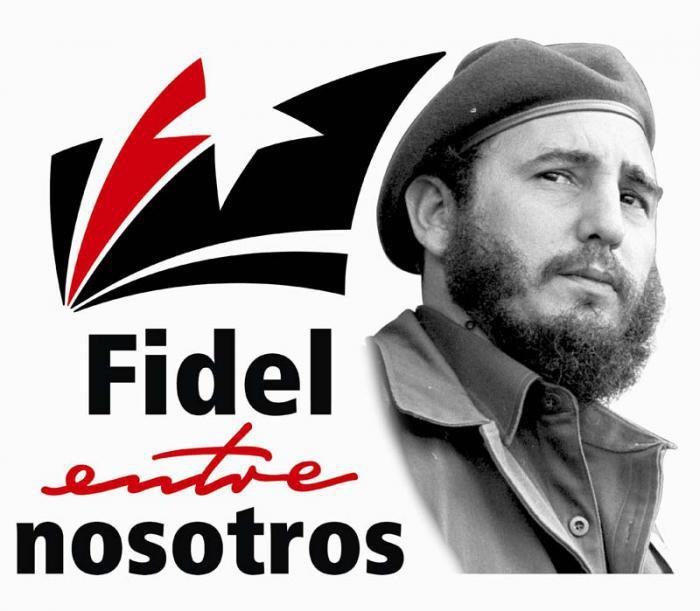
Fidel requires no physical monuments. He is present in
every
struggle against imperial domination, oppression and
exploitation. His ideas resonate and pulsate in the efforts to
transform into reality the deepest aspirations of the peoples of
the world to create societies founded on justice and human
dignity.
It is profoundly fitting that as the world marks the
first
anniversary of Fidel's passing the people of Cuba are poised once
again before the ballot boxes in another reaffirmation of their
determination to continue along the road that Fidel forged. On
January 1, 1959, the Cuban people under the leadership of Fidel
took control of their country and destiny. Their successful
resistance of the empire is the concrete reflection of the
principled and dignified politics and leadership of Fidel.
No words can adequately convey the transcendent and
singular
meaning of Fidel; his significance extends far beyond the
geographical boundaries of Cuba. Since its inception, the Cuban
Revolution, under Fidel's leadership, has established an
unparalleled legacy of internationalism and humanitarianism.
José Martí declared, "Trenches made of
ideas are stronger
than those made of stones" and "a just cause -- even one buried in
the depths of a cave -- is mightier than an army."
Fidel is still with us in the trenches,
shoulder-to-shoulder
with us in our struggle to bring into being a better world,
demonstrating what can be achieved by holding aloft the banners
of Justice, Peace, Socialism, Internationalism and Human Dignity.
His legacy continues to be a living testament and
inspiration.
In this spirit, we declare along with the peoples of
the
world:
¡Fidel Presente, Siempre! Fidel Is
Ever Present!
On behalf of the Canadian Network On Cuba
Isaac Saney
CNC Co-Chair and
National-Spokesperson
Excerpt from Speech by Cuban President Fidel Castro as
Chairman of the Non-Aligned Movement, to the
34th UN General Assembly, October 12, 1979
"I speak in the name of the children in the world who
do not
have a piece of bread. I speak in the name of the sick who do not
have medicine. I speak on behalf of those whose right to life and
human dignity have been denied...I am here to warn that either
injustice and inequalities are solved peacefully and wisely, or
the future is going to be apocalyptic. The sound of weapons, of
threatening words and hegemony in the international arena must
cease. Enough of the illusion that the world's problems can be
solved with nuclear weapons. Bombs might kill the hungry, the
sick and the ignorant, but they cannot kill hunger, disease,
ignorance and the people's just rebellion. In the holocaust, the
wealthy will also die. They are the ones that stand to lose the
most in this world. Let us say farewell to arms and concentrate
in a civilized manner on the most urgent problems of our time.
This is the responsibility and most sacred duty of every
statesman in the world. Furthermore, this is an indispensable
requirement for humanity's survival."

Revolution Is...
- Yenia Silva Correa -
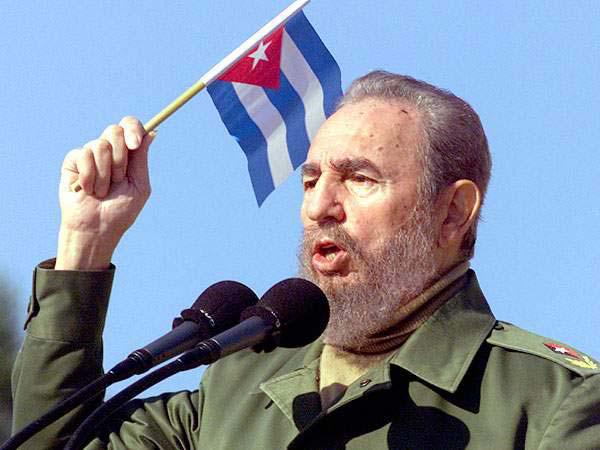
Comandante en Jefe
Fidel Castro Ruz announced his concept of Revolution
on May 1,
2000.
One year after Fidel Castro Ruz passed away, Cuba
remains a country in revolution.
A year after the death of the
historic leader of the Cuban Revolution Fidel Castro Ruz, the
Cuban people remain loyal to the ideas expressed in his concept
of Revolution, announced on May 1, 2000 in Havana.
The many lessons of his legacy have proven vital at a
time
when the country is facing adverse weather events, undergoing
necessary transformations, and working hard to build the kind of
future to which we aspire.
From the most common to the most difficult situations,
the
twelve key points of Fidel's Concept of Revolution continue to
mark the country's course as it looks to the future.
A Sense of the Historic Moment
This year Cuba paid well-deserved tribute to a
figure
whose
example has transcended the limits of time and space: the
Argentine-Cuban guerilla Ernesto Guevara de la Serna.
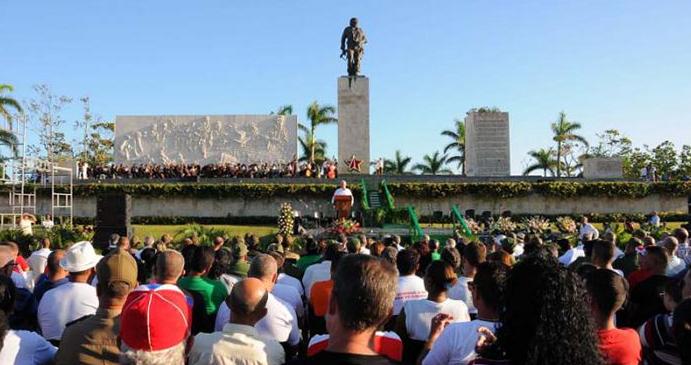
Homage to Che Guevara in Villa Clara, October 8, 2017.
At a time when right-wing forces are
reclaiming positions in regional governments, returning to the
ideas and experiences left to us by Fidel helps us to understand
the history Cuba shares with the people of the Americas and the
threat imperialism poses to the region.
Changing Everything that Must Be Changed
This principle is exemplified by improvements being
made to
the national education system (the third process of its kind to
be undertaken in the country).
With well-defined objectives (raising the quality of
the
teaching process, putting a greater emphasis on the role of
students in the learning process, and recognizing the figure of
the teacher), Cuban schools are aiming to transform themselves
into the most important educational centers in the community and
continue to fulfill their responsibility of training the new
generations.
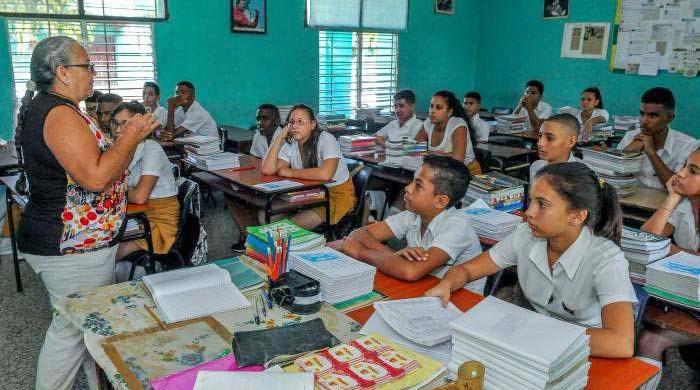
Cuban schools,
faithful to the Revolution and ideas of Fidel, are "changing
everything that
must be changed" in order to improve.
Full Equality and Freedom
These are rights that are being legitimized and
defended in
the country's 2017-2018 general elections, a genuine expression
of citizen participation. Cuba is one of just five countries
worldwide where the minimum voting age is 16, while individuals
are eligible to hold a position in Parliament once they reach 18
years of age.

The 2017-2018
general elections are a genuine expression of the principles of
full equality and freedom expressed in Fidel's concept of
Revolution.
However, the years of struggle that it has taken to
reach
these achievements for present and future generations have been
far greater; and must be preserved and protected.
Being Treated and Treating Others Like Human Beings
This is a principle which has been present in the
humanist
character of Cuban medicine, the most obvious examples being the
doctors and nurses, who since the earliest years of the
Revolution, have offered their solidarity and assistance in the
most difficult circumstance all over the world.

The
internationalist work of Cuban doctors is one of the clearest
examples of what Revolution means to the people of the island.
On January 31, 2017, the World
Health Organization awarded the Dr. Lee Jong-wook Memorial Prize
for Public Health to Cuba's Henry Reeve medical brigade -- created
by Fidel -- in recognition of their work combating natural
disasters and serious epidemics around the world.
Emancipating Ourselves on Our Own and Through Our
Own
Efforts
For almost 60 years of Revolution, Cuba has invested a
great
amount into training highly-qualified human resources, committed
to the principles of socialism and the country's development.
Meanwhile, the computerization of Cuban society, the
policy
for which was approved this past February by the Council of
Ministers, is one of the most important processes currently being
carried out on the island. It is among the efforts undertaken by the
country's leadership to emancipate "ourselves on our own and
through our own efforts," by prioritizing Information and
Communications Technologies as a strategic sector closely linked
to the island's economic growth and social development.
Challenging Powerful Dominant Forces In and Beyond
the
Social and National Arena
For almost 60 years Cuba has resisted aggression by the
United States, which has used a wide variety of methods in an
effort to crush the spirit of the Cuban people and eliminate its
principal leaders.
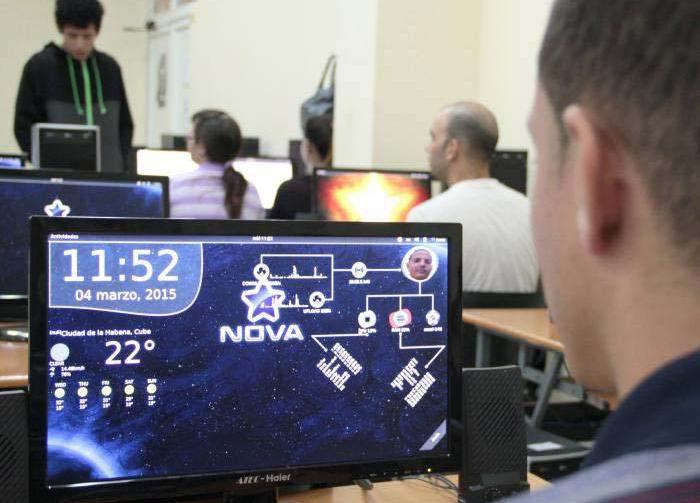
In order to
emancipate "ourselves on our own and through our own efforts,"
the
country is undertaking a process to computerize Cuban society
and has the
highly-qualified human resources to do so.
The continued application of the
economic, commercial and financial blockade; attempts to
interfere in the internal affairs of the country; efforts to
isolate Cuba politically within the international community;
the development and implementation of subversive programs; as well as
the
refusal to return territory illegally occupied by the Naval Base
in Guantánamo, are only a few examples of the struggles
Cuba faces, which have been, and will continue to be,
difficult.
Defending the Values in Which We Believe at the
Cost of
Any Sacrifice
The U.S. should not expect Cuba to "make
concessions inherent to its independence, or accept preconditions
of any sort," according to a Statement by the Revolutionary
Government issued in June this year. This followed the announcement
by U.S. President Donald Trump of the elimination of individual
people-to-people travel, the prohibition of economic, commercial
and financial transactions between U.S. companies and Cuban
entities affiliated with the Revolutionary Armed Forces or
intelligence and security services.
Modesty, Selflessness, Altruism, Solidarity and
Heroism
A prime example of such principles are the tireless
efforts
of Cuban doctors and teachers, who even under difficult
conditions, ensure that the people enjoy their rights to health
and education.
So too is the resolve with which Cubans face
daily challenges caused by the economic, commercial, and
financial blockade imposed by the United States, the way in which
we share what we have and not what's left over; our composure as
we prepare to face the future with the banner of socialism held
high.
Fighting with Courage, Intelligence and Realism
The
fact that Cuba is an island is an irrefutable reality which makes
the nation more vulnerable to the effects of climate change.
Last May, the Council of Ministers, approved the
Ministry of
Science, Technology and Environment's Tarea
Vida (Life Task)
project which -- as part of the government's strategy to
combat climate change -- features measures to preserve the life of
people in vulnerable areas, food security, and the development of
tourism.
Not only are human, material, and natural resources
important
to the country's development, but so too is knowing how to use
them wisely.
Never Lying or Violating Ethical Principles
The well-founded response by Cuban authorities to
allegations
of "sonic attacks" against diplomats from the United States
Embassy on the island, not only confirms the seriousness with
which Cuba complies with international agreements on the safety
and integrity of diplomatic personnel, but also features
scientific arguments proving the existence of a campaign aimed at
reversing advances made in the normalization of relations between
the northern country and Cuba.
A Profound Conviction that There Is No Power in
the World that Can Crush the Power of Truth and Ideas
The mass marches
held across towns and cities nationwide as part of May Day
celebrations, demonstrate how important defending the truth and
our ideas are to the Cuban people.
On the principle that "Cuba will not renounce its ideas
of
independence and social justice," hundreds of thousands of
workers, with their families and friends from all over the globe,
came together at the place where Fidel announced his concept of
Revolution 17 years before.
Unity; It Is Independence, It Is Fighting for Our
Dreams of
Justice for Cuba and for the World, Which Is the
Foundation of
Our Patriotism, Our Socialism, and Our
Internationalism
This premise alone encapsulates the unconditional
support
shown by Cuba in international forums for the most noble causes,
including the struggle against illiteracy; training foreign
students on the island; its opposition to all the forms of
colonialism which still exist in the world today: and its
solidarity with progressive and legitimately elected governments,
and the oppressed classes. It is the humanist essence that has
characterized this almost 60-year process, which would not have
been possible without Fidel.

May Day 2017 in Havana. Fidel's image was present in plazas across the
country during
May Day celebrations.

Cuban People Pay Homage to Fidel on the
Anniversary of His Death
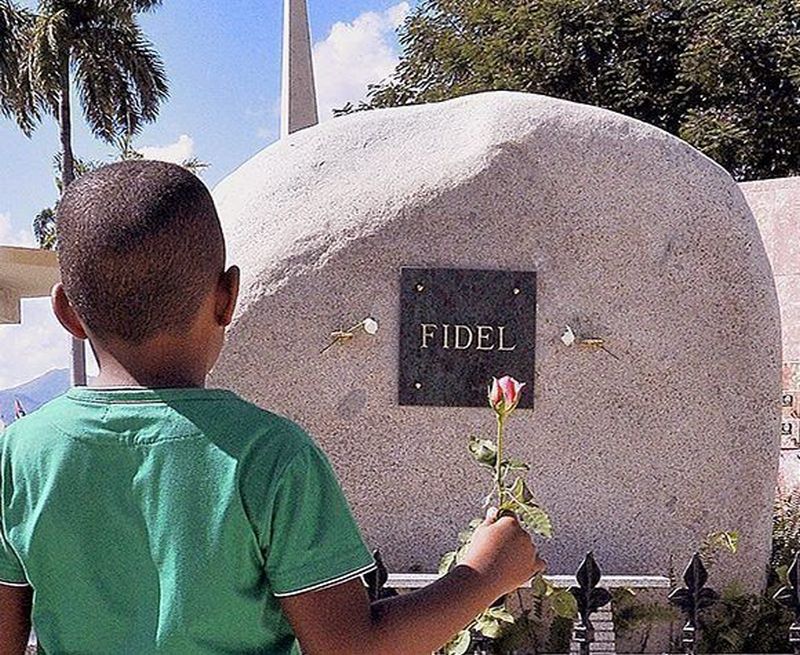
A Cuban youth places a rose at Fidel's tomb, Santa Ifigenia
Cemetery in
Santiago de Cuba, November 23, 2017.
Today, November 25, and in the days leading up to the
first anniversary of the death of their leader, Fidel Castro Ruz, the
Cuban people are paying tribute to Fidel with activities that express
their profound commitment to the revolutionary outlook that he
epitomized and that continues to inspire them.
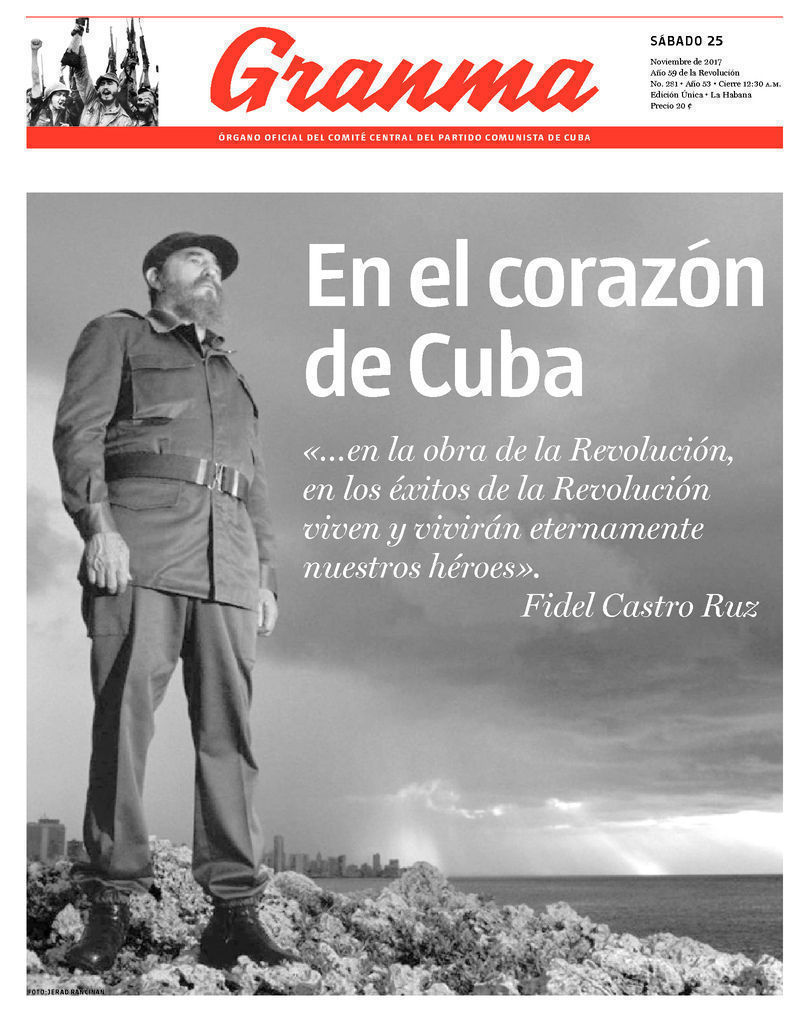 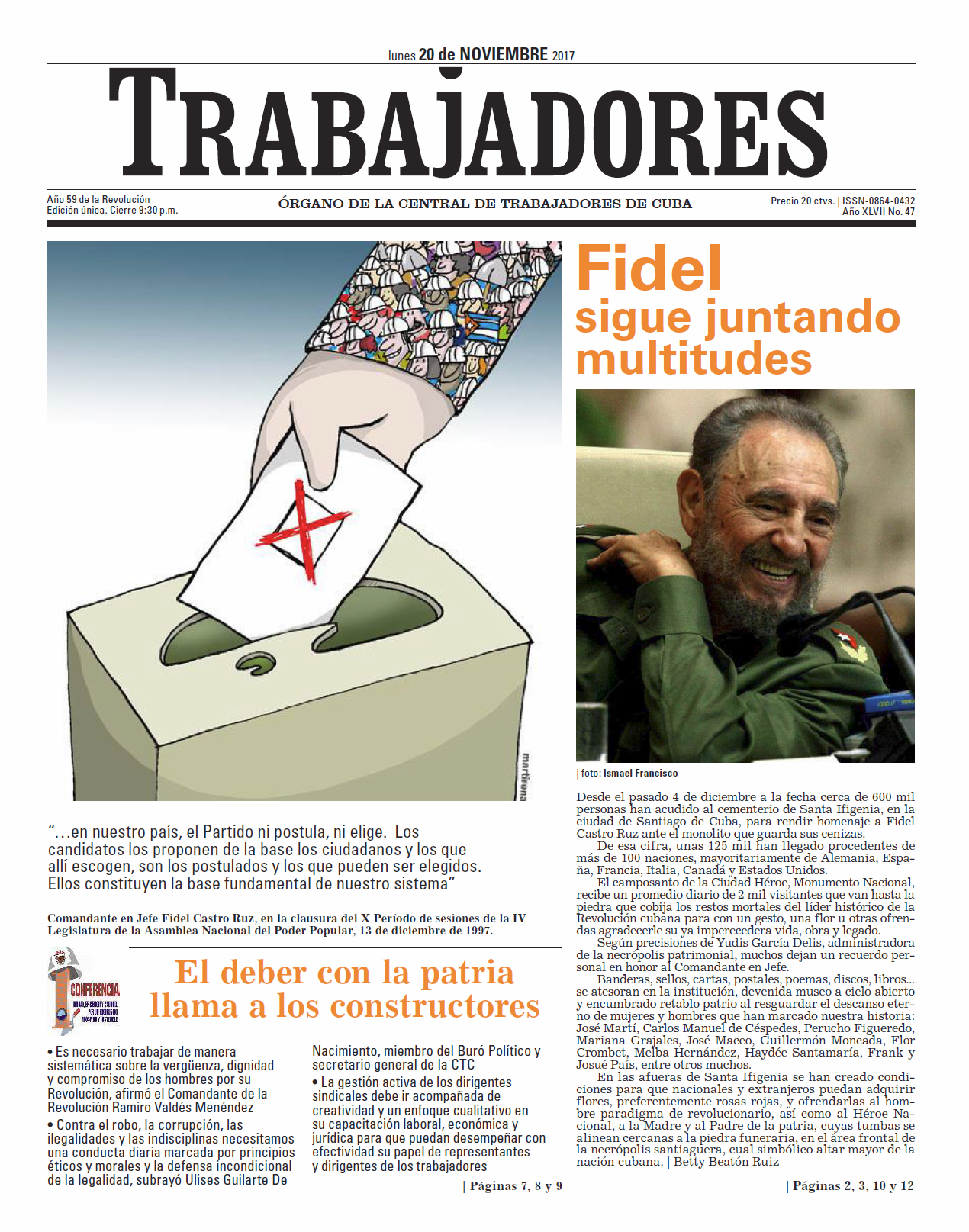
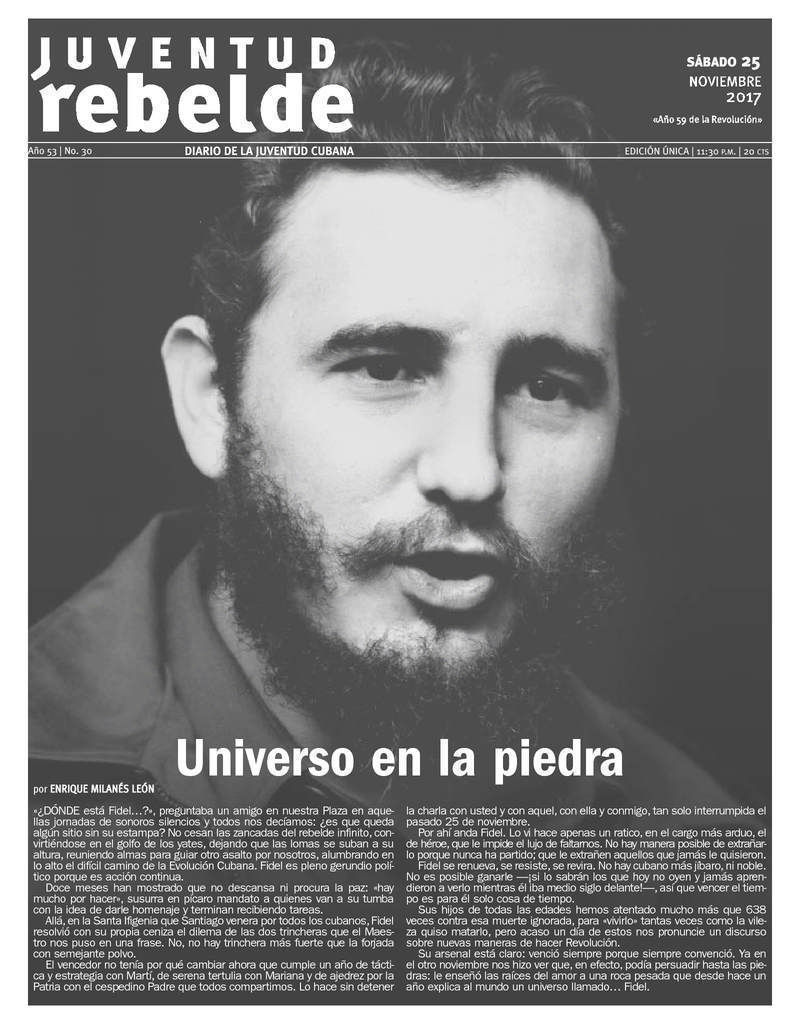 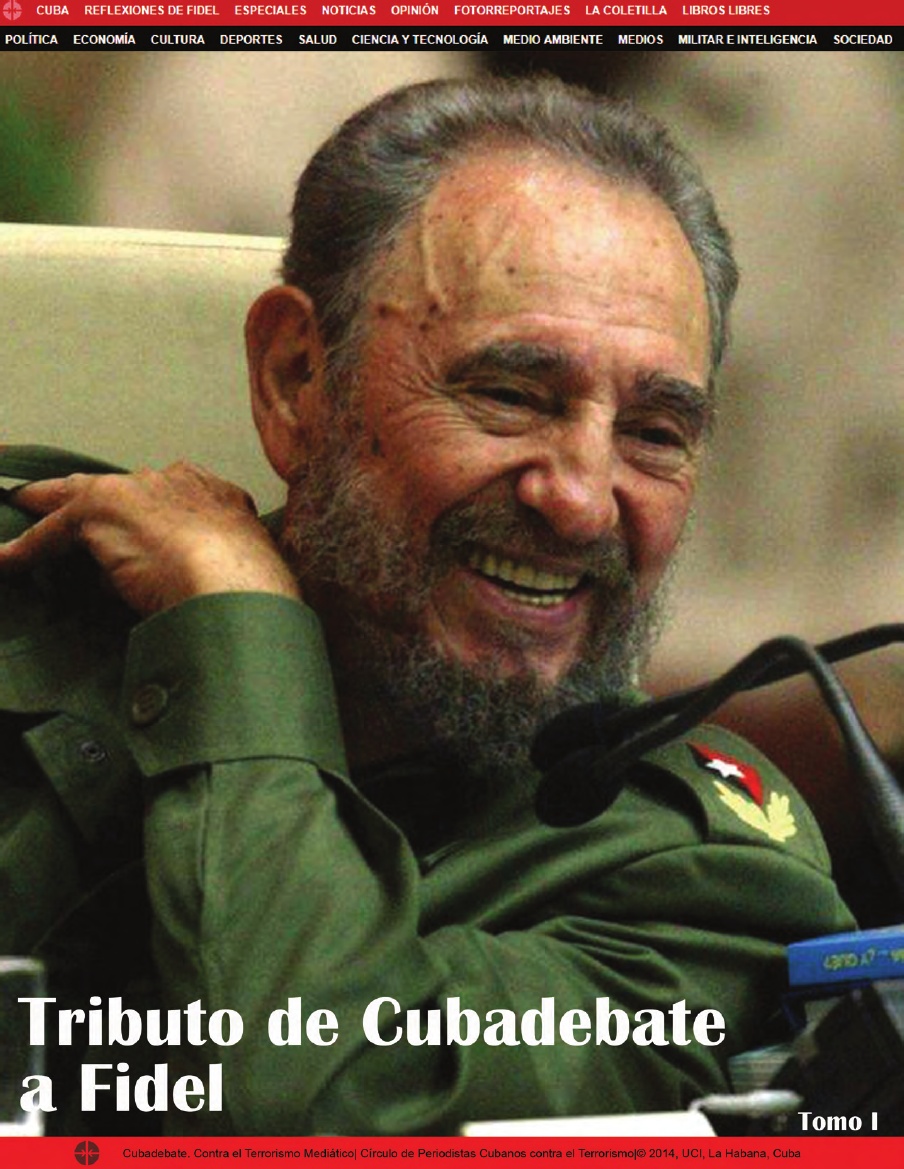
Cuban publications issue special editions to mark
this anniversary, including a special 100-page volume by CubaDebate
compiling articles on Fidel
it published November 26-29, 2016.
To download the book, click here.

The CubaDebate website includes a page where Cubans can leave
their personal
tributes to Fidel. To view, click here.
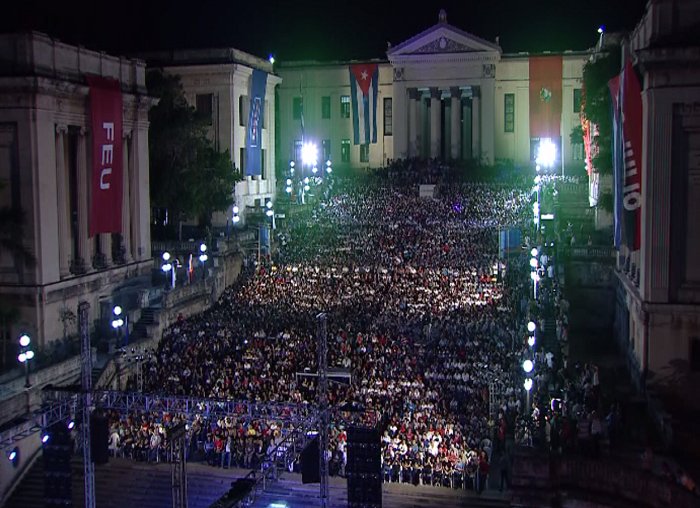
 

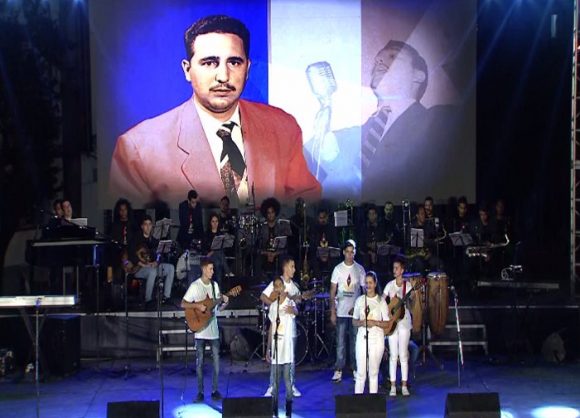
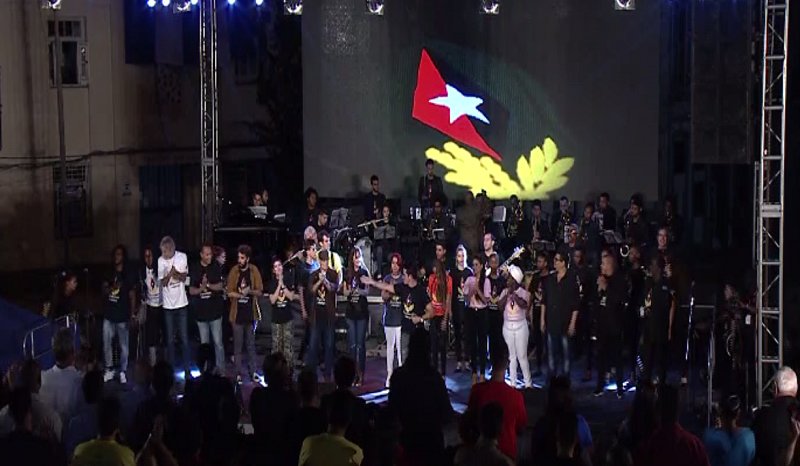

Youth and students pay tribute to Fidel at his alma mater, the
University of Havana,
November 25, 2017 in an event called "Cantata por Fidel" (Song for
Fidel).
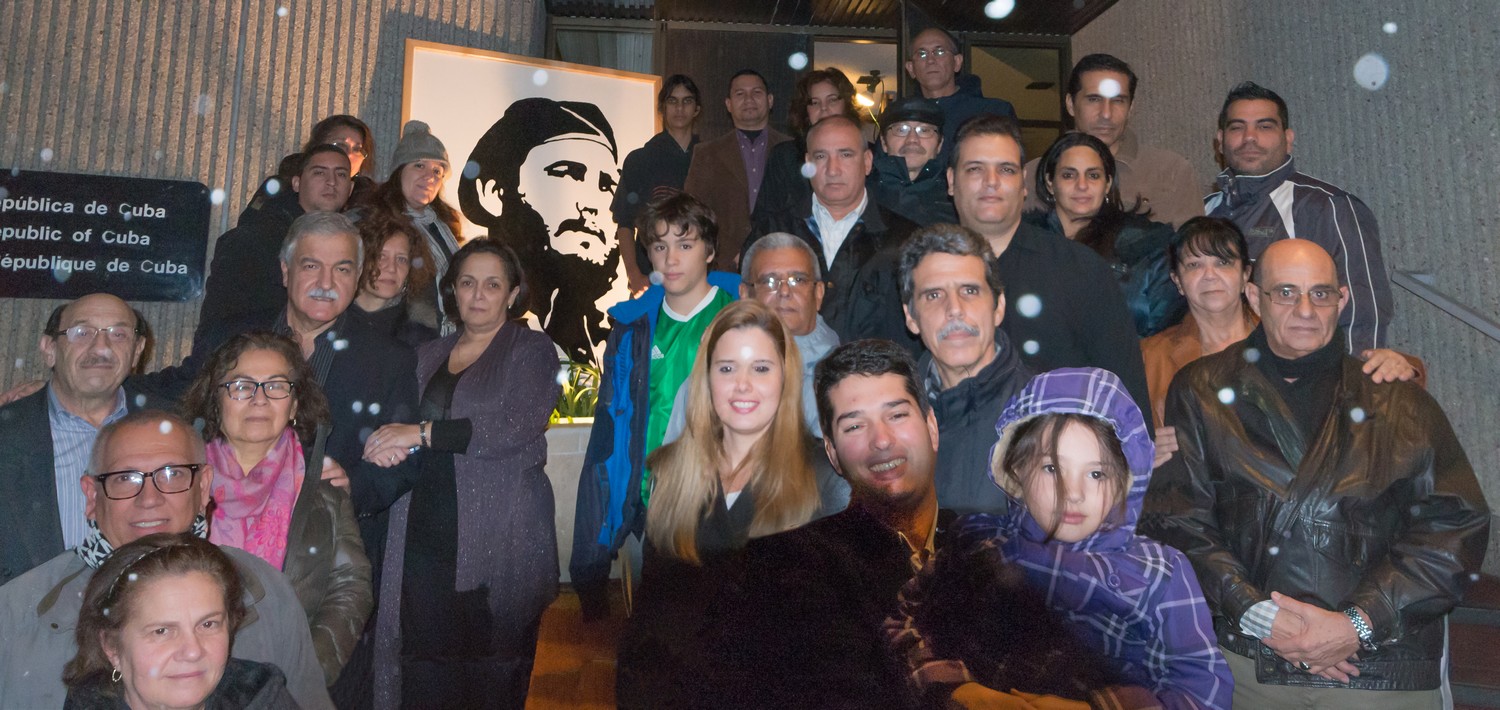
Tribute to Fidel at the Cuban Embassay in Ottawa, November 26, 2017.
Such tributes are held at Cuban diplomatic offices worldwide and in the
many places were Cuban personnel are present as part of its
internationalism.
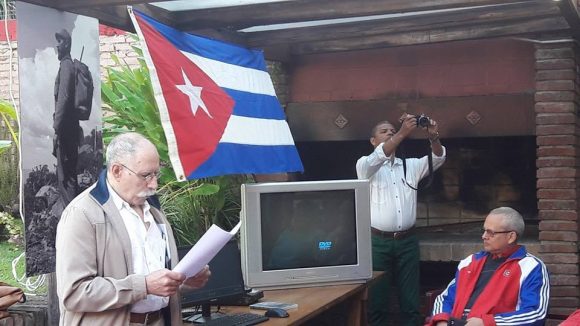 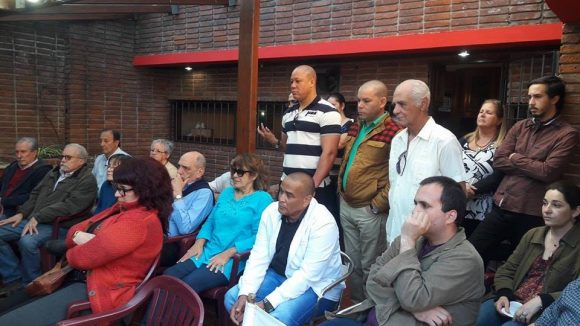
Tribute to Fidel at the Cuban Embassy in Uruguay, November 25, 2017.

Tribute to Fidel at the Cuban Embassy in Uruguay, November 25, 2017.
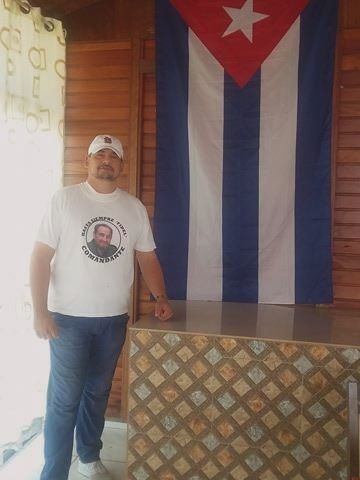 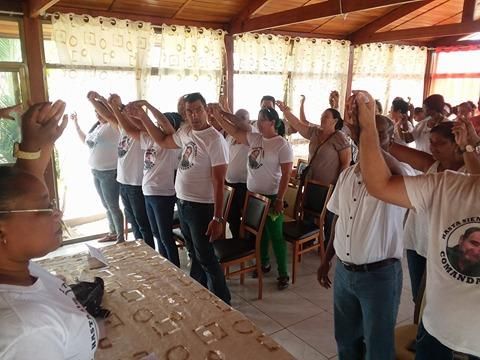
Cuban collaborators in Angola hold a tribute to Fidel, November 25,
2017.
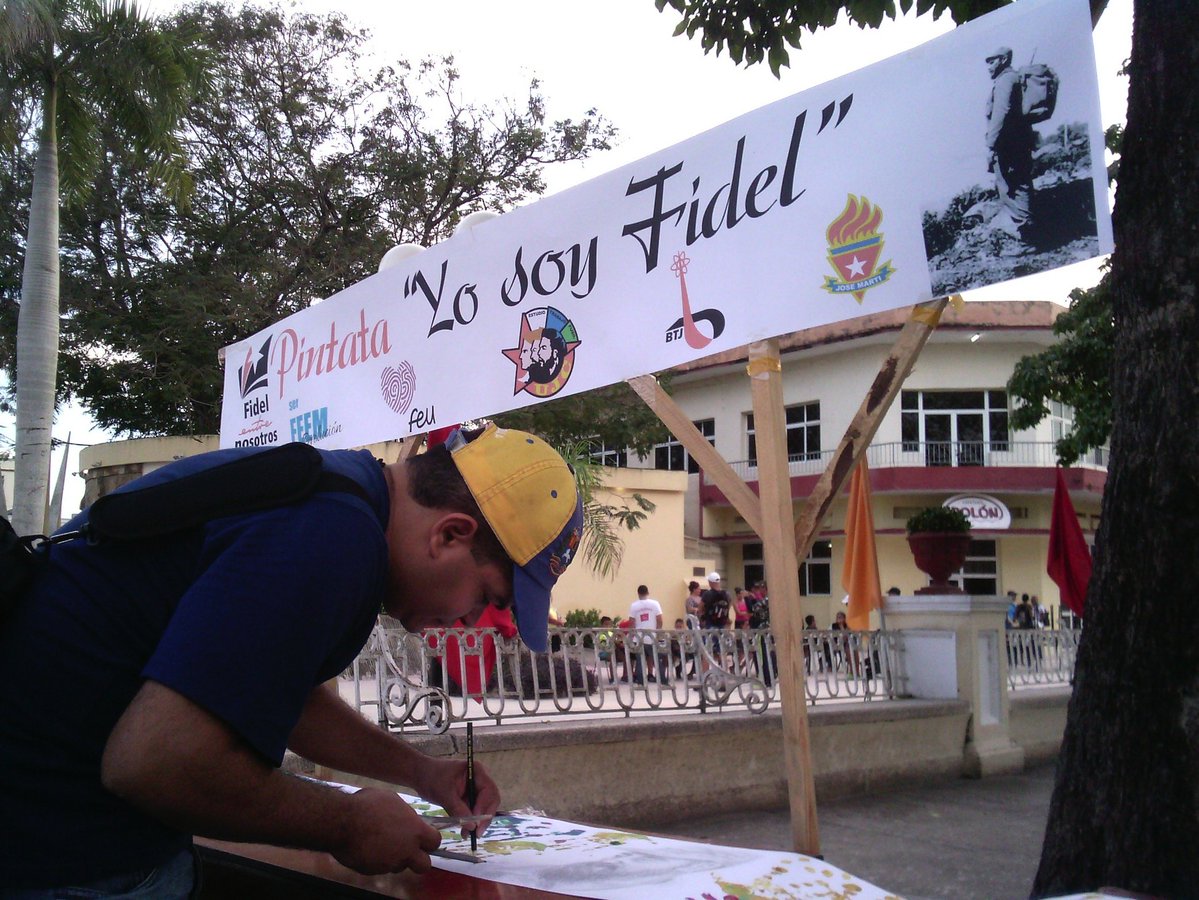
Youth in Las Tunas setup their tribute to Fidel in the centre of the
city, November 25, 2017.
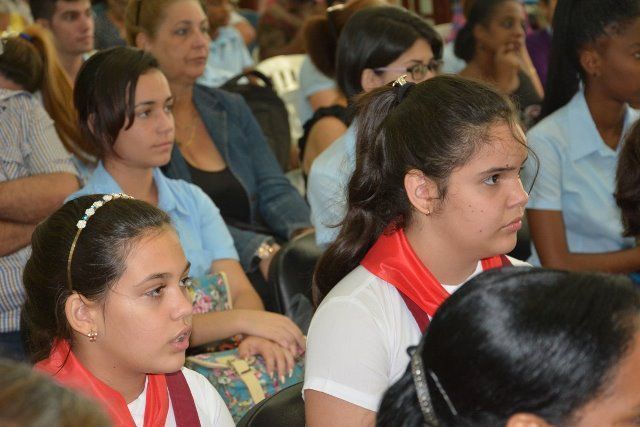 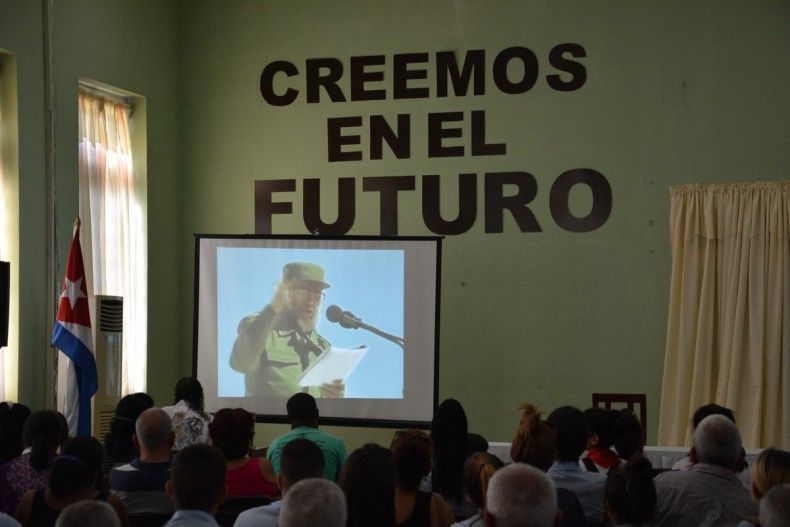
In Pinar del Río, a colloquium on the mark Fidel left on Pinar
del Río province,
November 25, 2017.
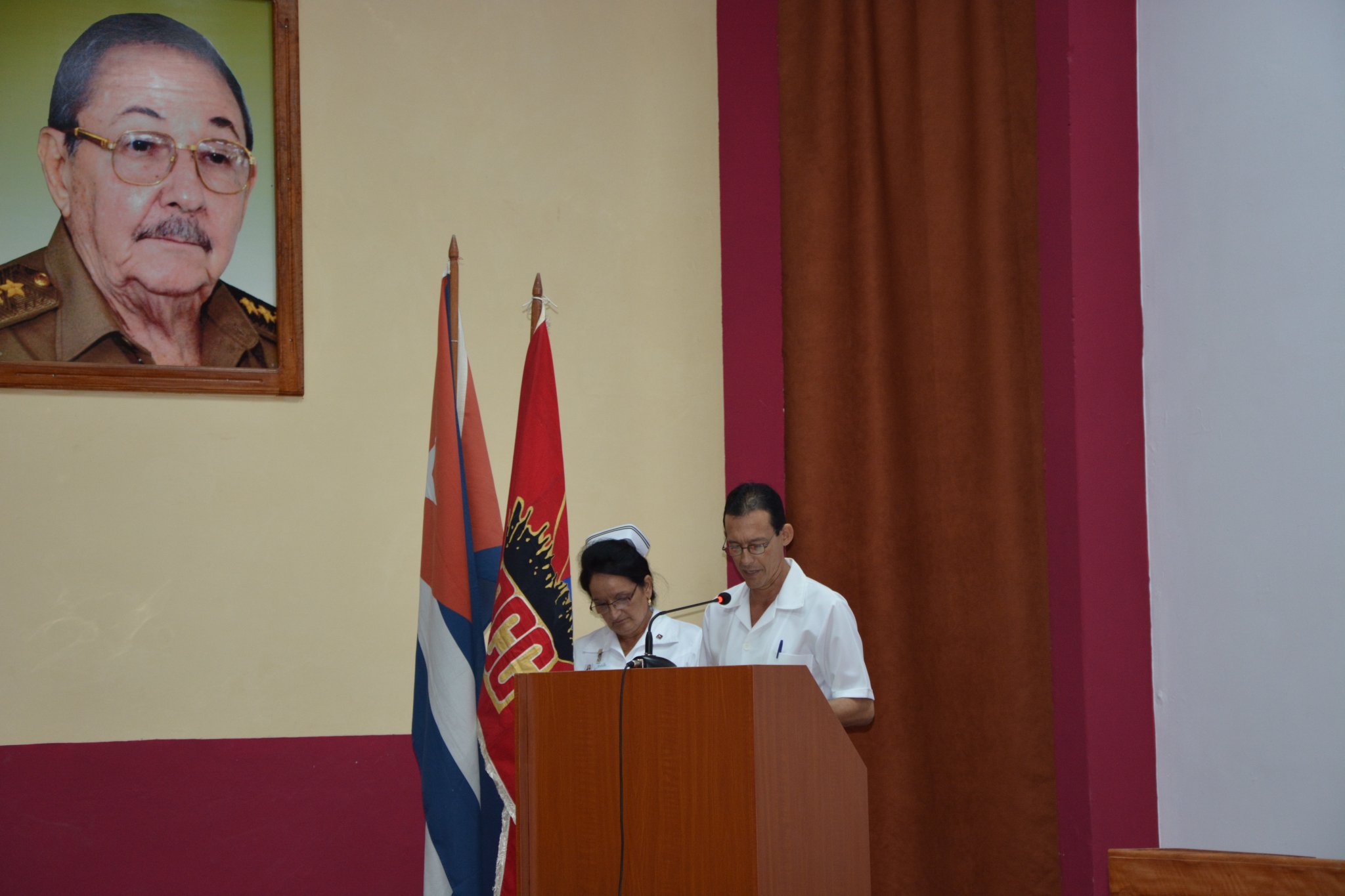 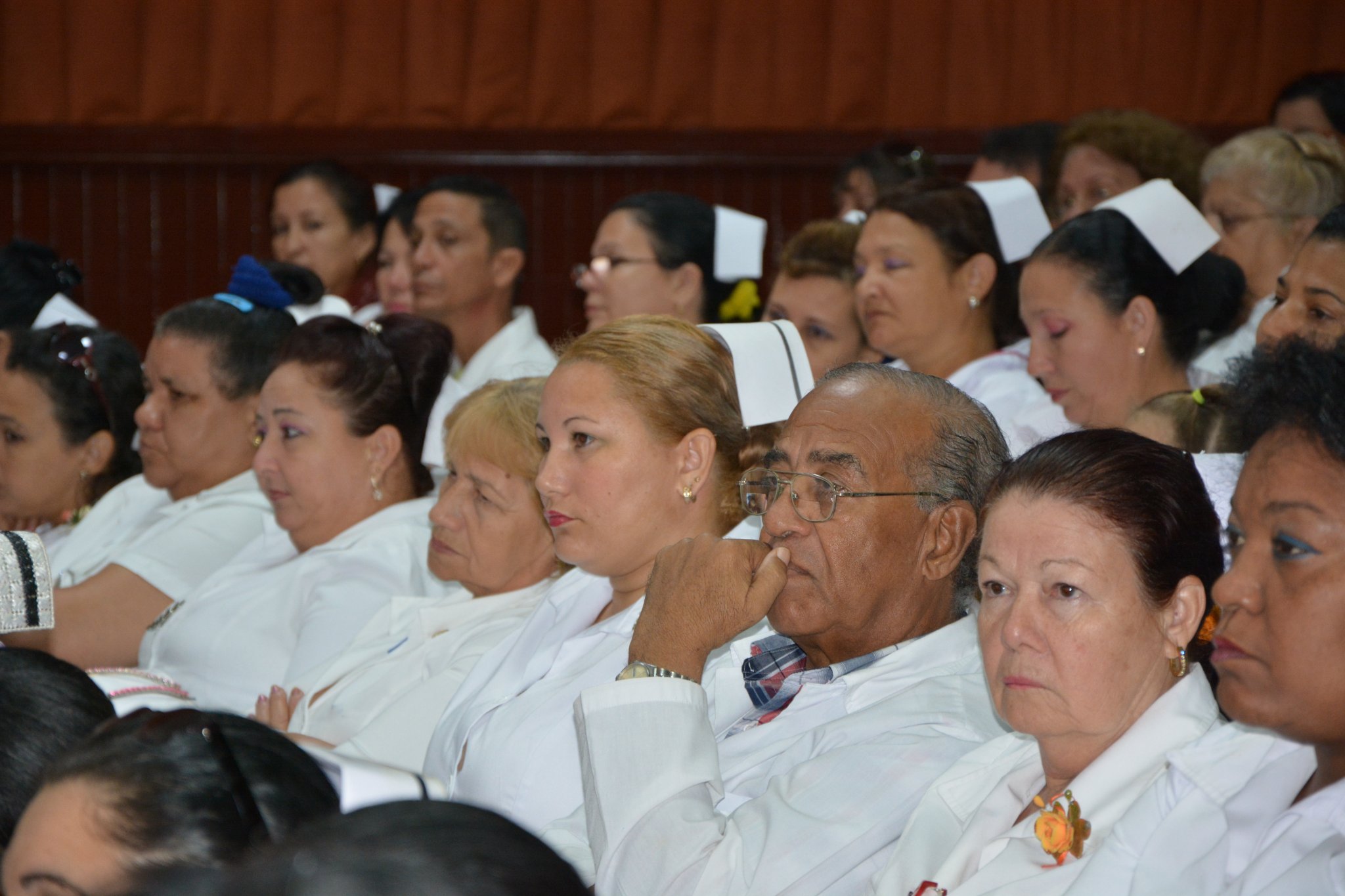
Workers at the V.I. Lenin Hospital in Holguín pay tribute to
Fidel,
November 25, 2017.
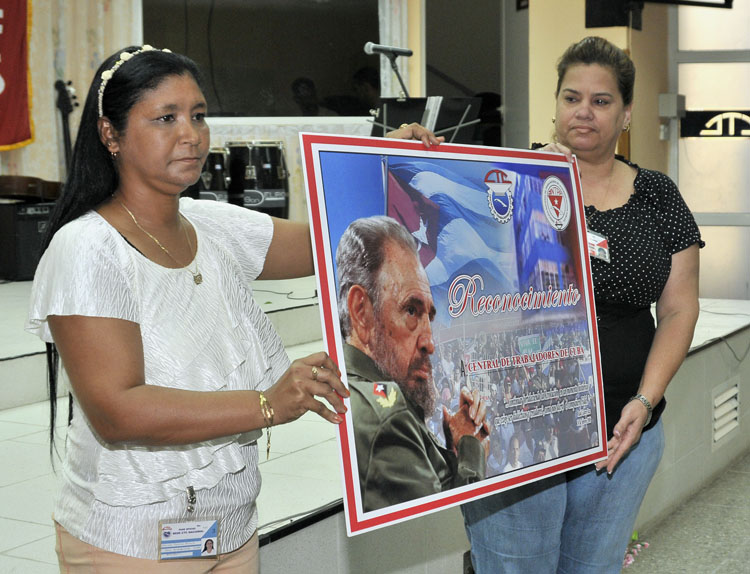 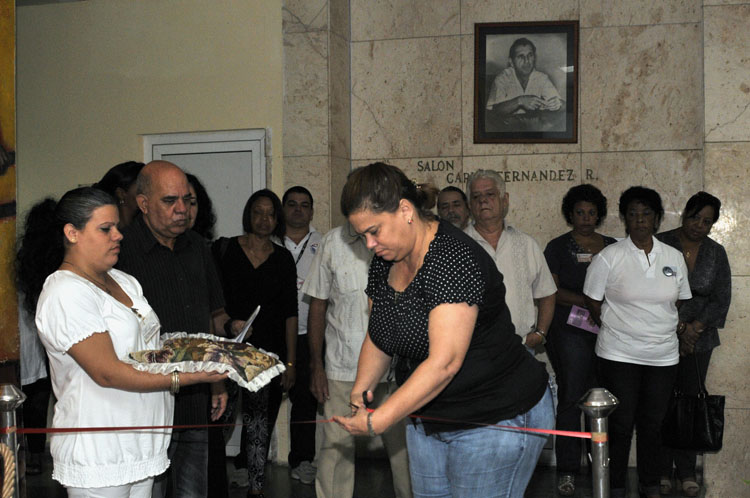
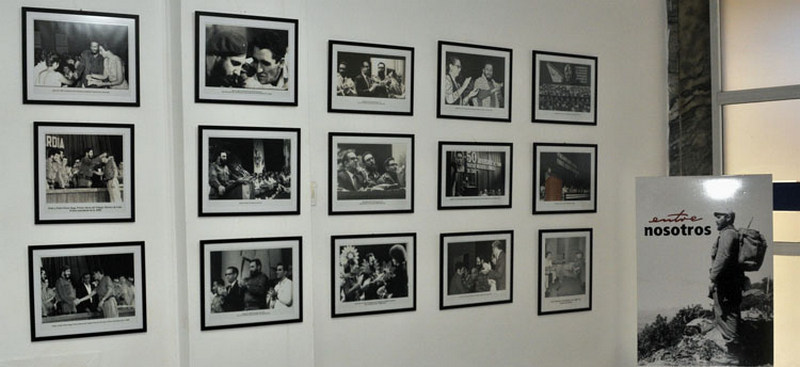
The Confederation of Cuban Workers (CTC) pays tribute to Fidel on
November 24, 2017 with the inauguration of a photo exhibit entitled
"Fidel Among Us" at its headquarters in
Havana. The photos document 64 of Fidel's visits to the CTC at decisive
points in the country's history
and that of the
CTC.
 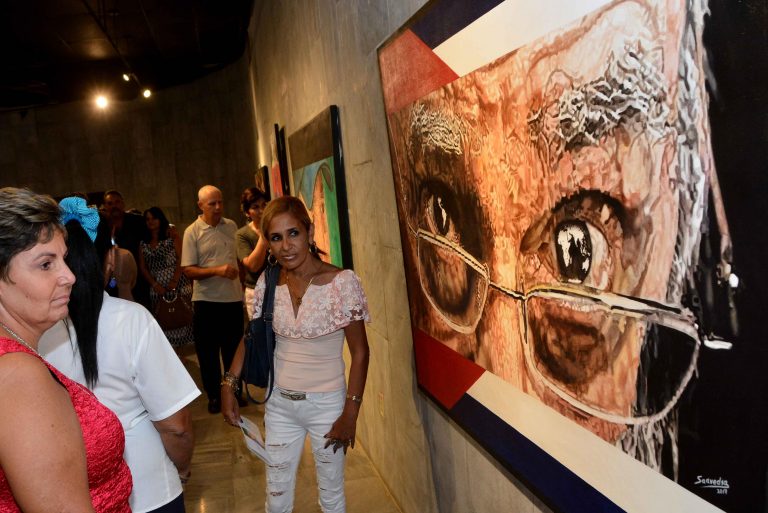
In Havana on November 24, 2017, an exhibit of paintings by the young
artist Reinier Saavedra Sotolongo in tribute to Fidel, titled
"Semblanza" (Semblance), opens at the José Martí
Memorial in Revolution Square. At left, Cuban hero René
González.
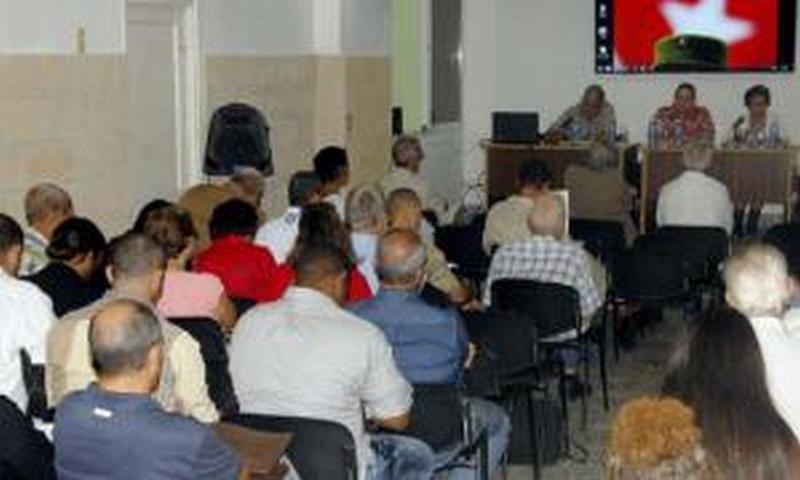
A workshop on "The Strategic Thought of Fidel Castro Ruz: International
Relations and Foreign Policy," November 23, 2017.
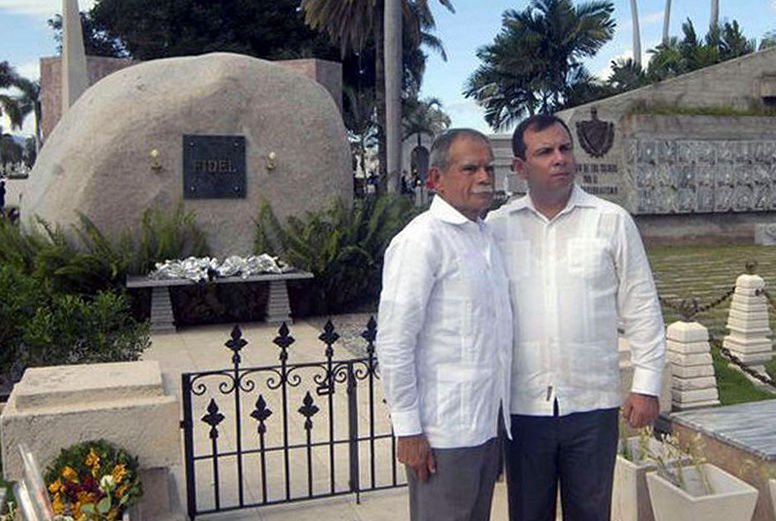
Puerto Rican independence fighter Oscar López Rivera, comes to
pay his
respects on
November 21, 2017, accompanied by Cuban hero Fernando
González Llort, President of
the
Cuban Institute of Friendship with the Peoples (ICAP).
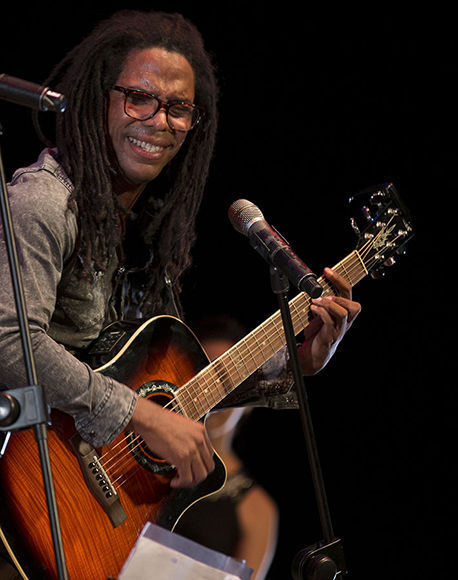 
Cuban singer-song writer Raúl Torres debuts a new song written
in
memory of
Fidel, titled "Laureles y Olivos" (Laurels and Olives).

Fidel Honoured in Washington
The willingness of the historic leader of the Cuban
Revolution, Fidel Castro, to improve relations with the United
States while preserving the island's sovereignty was highlighted
during a panel discussion in honour of the first anniversary of
the revolutionary leader's death, November 25, 2016.
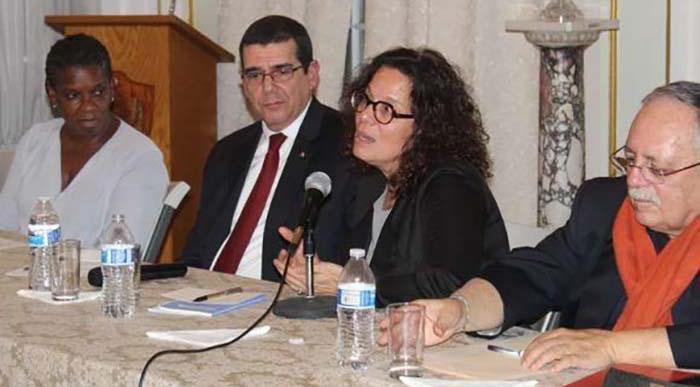 Renowned researcher Julia
Sweig speaking during a panel dedicated to Fidel. On the left are
activist Gail Walker and Cuban Ambassador to the United States
José Ramón
Cabañas; on the right is
Cuban-American lawyer José Pertierra. Renowned researcher Julia
Sweig speaking during a panel dedicated to Fidel. On the left are
activist Gail Walker and Cuban Ambassador to the United States
José Ramón
Cabañas; on the right is
Cuban-American lawyer José Pertierra.
The panel was moderated by Cuban Ambassador to
the
United States José Ramón Cabañas and
featured U.S. experts who discussed Fidel's continual efforts to
improve relations with the northern neighbour and strengthen ties
with U.S. citizens.
Before diplomats from various countries and friends of
Cuba, Executive Director of the Interreligious Foundation for Community
Organization/Pastors for Peace Gail Walker highlighted the
altruistic essence of the Cuban Revolution and the support
offered by the island to many countries around the world.
The activist noted that Cuba extended its
solidarity
to the United States following Hurricane Katrina in 2005, when
Fidel offered to send over 1,500 doctors to treat victims of the
disaster, a proposal that was rejected by then President George
W. Bush.

Panel discussion dedicated
to Fidel at the Cuban Embassy in Washington.
Walker also mentioned the Latin American
School of
Medicine in Havana, where 170 U.S. citizens from underserved
communities have been trained to date, as part of an initiative
set up by the Comandante en Jefe.
Meanwhile, Latin American studies expert Julia Sweig,
recalled seeing Fidel debate issues related to Cuba with some of
his strongest critics. According to the former member of the
influential
Council on
Foreign Relations, the Caribbean leader held open discussions
with U.S. economic, cultural, and political figures, in which he
encouraged the strengthening of ties between the two
countries.
Speaking to Prensa
Latina, Sweig pointed out that
although
the U.S. public is very diverse, the vast majority support the
normalization of relations with Cuba, and noted Fidel's
contribution to achieving this goal.
Peter Kornbluh, director of the Cuba Documentation
Project
with the George Washington University's National Security
Archive, explained that the Comandante
en
Jefe was well aware of
the difference between the U.S. government and the people.
The historian, who recently traveled to Cuba to visit
the
place where Fidel Castro's remains are interred at the Santa
Ifigenia Cemetery, in Santiago de Cuba, spoke about the various
occasions on which the revolutionary reached out to the U.S.
government.
Kornbluh, co-author of Back Channel to Cuba: The
Hidden
History of Negotiations between Washington and Havana,
stated that Fidel was always willing to engage in dialogue, only
asking that the island's sovereignty be respected.
This was reaffirmed by Cuban-American attorney
José Pertierra, who noted that the only thing Fidel was
unwilling to accept was the imposition of conditions.
Unlike the U.S. government, Fidel was willing to
maintain
good relations from the start. It was the United States that presented
the problem, not Cuba, Pertierra asserted.

Cuban Event on Thought of Fidel Castro
Held in Guantánamo
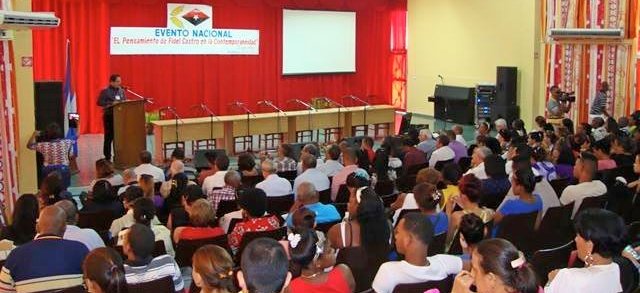
The University of Guantánamo (UG), from November
16 to 18,
hosted Cuba's First National Scientific Event on Fidel Castro's
Thought in Contemporary Times, to promote scientific exchange on
the life of the Cuban leader and his international significance.
The event was sponsored by the Ministry of Higher Education, the
José Martí Cultural Society, the Association of
Pedagogues of
Cuba and also the Honorary Chair for the Study of the Thought and
Work of Fidel Castro Ruz and the AfroCaribbean Studies Department
of the UG, among other institutions.
The event took place almost a year after the death of
Cuba's
Commander in Chief and more than 150 professors and university
students from almost the entire country attended, Elcira Favier
Pereira, president of the organizing
committee, told the Cuban News Agency.
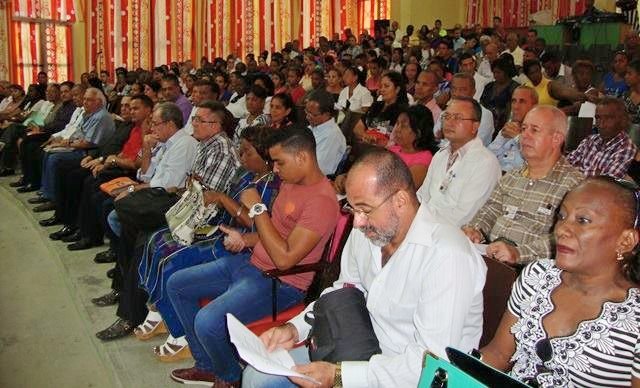
Featured participants included leading national experts
from
the field, such as Francisca López Civeira, prestigious
researcher at the University of Havana; Katiuska Blanco,
journalist and student of Fidel's life; and René González
Barrios, President of the Institute of History of Cuba.
The opening day of the event began with the keynote
speech
titled, "Being Marxist-Leninist Like Fidel Castro," delivered by
Dr. Rafael Cervantes Martínez, Director of the Department of
Marxism and History of the Ministry of Higher Education.
The program also included seven symposiums. Their
themes
covered the foundational thinking of the ideology of the Cuban
Revolution and its impact on the revolutionary work of Fidel
Castro; the influence of José Martí, Ernesto Guevara and
Marxism-Leninism in the praxis of Fidel Castro; the scope of
Fidel's actions in the international context; the Concept of
the Revolution articulated by Fidel as the foundation for a
prosperous and sustainable socialism; and the transcendence of
Fidel's thought in Cuban university students, a
discussion reserved for students.
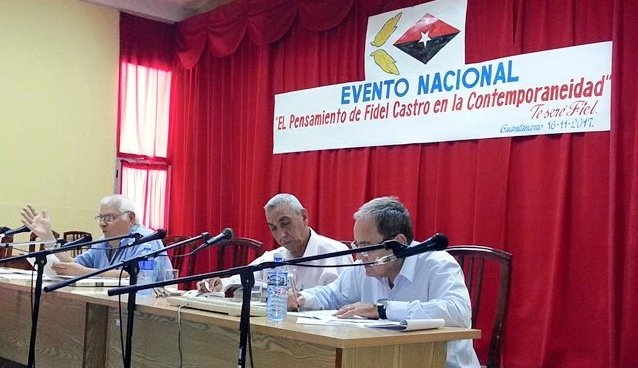
Among the other activities at the event was the
planting of a
caguairán tree at the Raúl Gómez
García
headquarters of the UG to commemorate Fidel's life and work. This
tree, whose wood is of exceptional hardness, is considered by
Cubans a symbol of the moral firmness of the leader of the
Cuban Revolution.

Every Word a Concept, an Idea
- Marta Rojas Rodríguez -
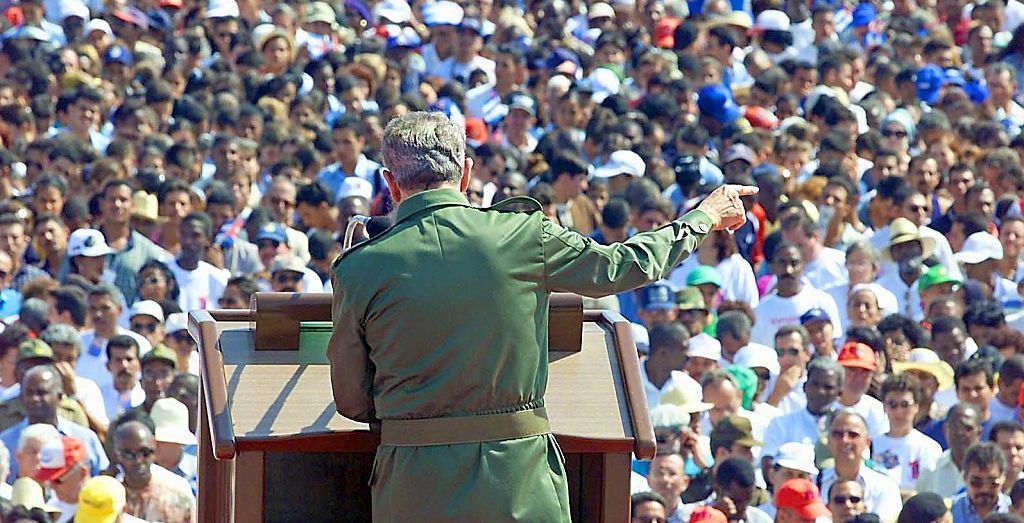
Fidel presents his "Concept of Revolution" during 2000 May Day speech
in
Havana.
The first time I read "Every word an idea" on
the poster of the Concept of Revolution expressed by
Commander in Chief Fidel Castro, the first word that struck me
was "modesty." I thought back to a time as long ago as 1955 when,
as everyone would agree, Fidel was already considered to be a
knowledgeable man. Upon graduating from the Belén school, the
lofty praise of the Jesuit priests left no doubt that he was, and
would later become even more so.
By 1955, the young lawyer had already given his
indisputably
rich and eloquent self-defense known as History Will Absolve
Me.
However, the word "modesty" made me think back to a
passage
from a letter or document -- I can't remember exactly which --
that Haydée
Santamaría gave me to read in May 1955: "Read this passage by
Fidel, you're going to like it." It was just a section that could
have been from some document about his plans, a letter to a
friend or to Haydée and Melba [Hernández] about their
revolutionary plans,[1]
which, logically, were of the utmost discretion. I read the
passage marked. I was at Melba's parents' house on Jovellar
Street where, after the two women were released from Guanajay
prison, they had set up an office to receive everything sent by
Fidel while he was in prison on the Isle of Youth, following the
Moncada attack.
I took the piece of paper, which was folded to show
just the
passage and dated May 19. I read in Fidel's handwriting:
"I'm obsessed with [the novel] Cecilia Valdés
by
Villaverde. It hadn't interested me for years but now I'm in a
hurry to read it. I have lived happy days, enthralled, oblivious
to everything, practically transported to the last century, in
the pages of this formidable history of Cuba.
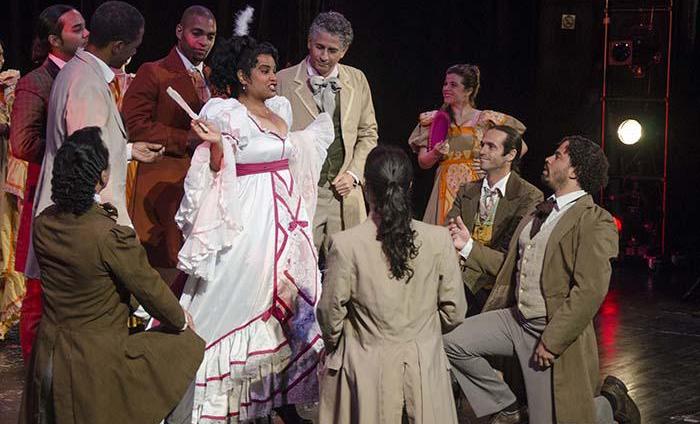
Cuban theatre production based on classic novel Cecilia Valdés
by
Villaverde.
"For quite some time now I have wanted to know more
about our
past, our population, and the people of yesterday. My enthusiasm,
interest, and passion in everything I'm reading about helps me.
This time I want to talk about the work of the person who
superbly painted that period, some aspects of which are still
alive in the Cuban mentality, above all in regards to that
interesting problem of slavery, because I'm realizing that it is
the cause of a great part of the enormous confusion and
vacillations which characterized Cuban political thought through
1868.
"When it comes down to it, reading a novel is a method
I like
because it allows me to take a rest from study while redoubling
my interest. I often feel a little tempted to break into the
field of fiction; although luckily, history occupies me, and even
more so, when it's in this form, when it's not just political,
economic, socio-cultural history, but the broadest and deepest
history you could ask for.
"I commemorated December 7 by reading, full of profound
veneration, Maceo's letters and documents in the volume I have
from the Cuban Society of Historic Studies. Days earlier I spent
charming moments with Zweig's biography, indisputably superior to
that of Rourke. So that's how the days go by, quite easily in
fact."[2]
What modesty and an interest in history!
Further down, almost at the end of the now historic Concept
of
Revolution according to Fidel, I read:
"Fighting for our dreams of justice for Cuba and for the world,
which is the foundation of our patriotism, our socialism and our
internationalism." I was struck by more than just a word, and
just like that, I began to recall more of Fidel's remarks. It was
almost like I was hearing him speak, just like I had during the
Moncada trial when he referred to the revolutionary program led by
the July 26 movement, and which would soon become a strategic
victory and definitive triumph of the Revolution.
At that time (1953) he said, "We also declare that
Cuba's
policy in Latin America will be one of close solidarity with the
peoples of the continent and those politically persecuted by
bloody tyrannies..."
Thus just like Martí, whom Fidel proclaimed as
the
intellectual author of the Moncada assault, every word, speech,
or concept, outlined in brief passages by Fidel, is an eternal
expression of his sense of the historic moment.

Fidel Castro (centre) and
other Moncada rebels released from prison, May 1955, following a failed
attempt to overthrow U.S.-installed puppet dictatorship of Fulgencio
Batista
on July 26, 1953.
Marta Rojas Rodríguez is a Cuban writer and
journalist.
Freshly graduated from journalism school in Havana in 1953, she
covered the events of the assault on the Moncada Barracks,
including the trial of Fidel Castro, although the reports she
submitted were censored. She joined Granma in 1965. In
1997, she was awarded the José Martí National Prize for
Journalism in recognition of her life's work.
Notes
1. Haydée Santamaría and Melba
Hernández were both veterans of the attack on the Moncada
Barracks in 1953, and went on to take part in the Cuban
Revolution.
2. After the triumph of the Revolution,
documents and letters written by Fidel from his cell on the Isle
of Youth were published, including the one referencing Villaverde's
novel.

Fidel Launched Us into Battle
- Alejandra García -

Youth honour guard at University of Havana, November 28, 2016,
following Fidel's death.
November 17, 2005, was a hectic day at the University of
Havana (UH). Celebrations for International Students' Day, at
that time commemorating 60 years since the Commandeer in Chief
first entered this higher education institution, had attracted
thousands of university students from all across the city,
impatiently waiting for Fidel to arrive.
That day changed our lives forever, recalls Dr. Elier
Ramírez
Cañedo speaking to Granma International, who despite
being President of the UH's Federation of University Students at
the time, almost couldn't get into the Aula Magna [Great Hall]
where Fidel was scheduled to speak. Once inside, however, he
noted that such an atmosphere of intimacy was created that every
student felt as though Fidel was speaking directly to them.
Fidel began with words of gratitude to the youth
gathered
there, and a sort of apology.
"You have been very kind in commemorating a very
special day
today: the 60th anniversary of my timid start at this University
[...] Not to have attended, at this time, a ceremony in the Aula
Magna, invited by you all, would have been the greatest sorrow of
my life," stated Fidel.
This encounter was Fidel's return to the starting
point,
explains the young historian. It was his return to the place where
"this
island, this small island's concern" began, at a time when "there
was still no talk of globalization, television didn't exist,
there was no Internet or instant communication from one side of
the planet to the other, when telephones hardly existed [...],"
as the leader of the Revolution explained to the youth assembled
there that November afternoon.
According to Ramírez, "He spoke with the
university students,
in whom he always had trust, in order to tell them things that
perhaps he might not have felt as comfortable or encouraged to
address in other settings." This was an important speech.
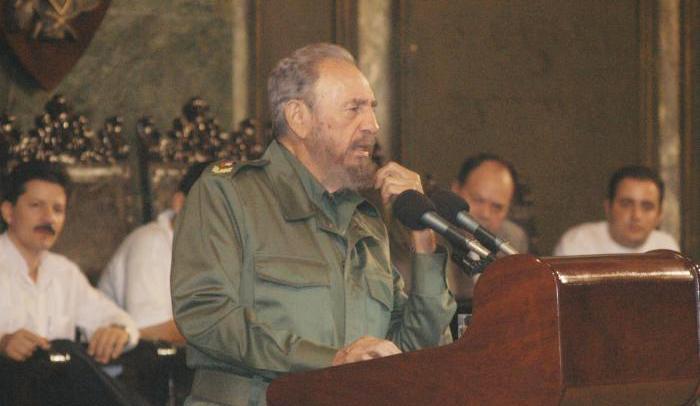
Fidel speaking at University of Havana, November 17, 2005.
That November 17, the Commander in Chief expressed an
idea
which inevitably underlies the rational understanding of any
historical process: the possibility that transformations can be
undone.
In this sense, Fidel explained that "among the many
errors we
have all committed, the most important has been to believe that
any one of us knew about socialism, or that any one one of us knew
how to build socialism."
Later he questioned whether revolutions are destined to
fail
or, "is it people that bring down revolutions? Can people, or can
society stop revolutions from collapsing? [...] This Revolution
can be destroyed ... we can destroy it, and it will be our own
fault."
However, Fidel was also optimistic, says
Ramírez. He trusted
in the ability of the people, and above all the youth to whom his
comments were directed, to tackle the country's main
problems.
"If we are going to wage a battle we must use better
quality
missiles, there must be criticism and self-criticism in the
classroom, in the [Party] nucleus, and then beyond the nucleus,
then in the municipality, and then across the country," stated
the Commander in Chief speaking from the podium of that
magnificent space where the remains of Cuban philosopher and
priest Félix Varela lie in a marble urn.
Thus, his words marked a "before and after in the
course of
the Revolution."
"He focused the lens on our own errors; errors which
are more
dangerous than the entire machinery of our powerful enemies. I
mean, without these problems, which Fidel denounced, such as
wastefulness, corruption, bureaucracy, and other ills, no enemy,
no matter how powerful, would be able to advance in their plans,"
explains Ramírez.
This doesn't mean that Cuba should ignore external
threats,
"but that we should also focus more attention on those internal
ills that could destroy the Revolution," he adds.
Fidel couldn't have been any more explicit: "This
country can
destroy itself; this Revolution can be destroyed. Today, they
[the imperialist powers] cannot destroy it; but we can, we can
destroy it and it will be our fault."
This doesn't mean that external enemies no longer
represent a
threat to Cuba, highlights Ramírez, but that Fidel "called on us
to broaden our idea of this enemy, because we had allies of the
northern neighbour who facilitated its work, right here in the
country."
"Fidel revealed that the Revolution can only be
sustained by
overcoming these internal ills," adds Ramirez, still moved by
that fascinating and enlightening celebration in honor of
International Students' Day at the University of Havana.
Fidel's words were magical and "we all surrendered
before
that special ability of his to mobilize us. They were a battle
cry," he states.
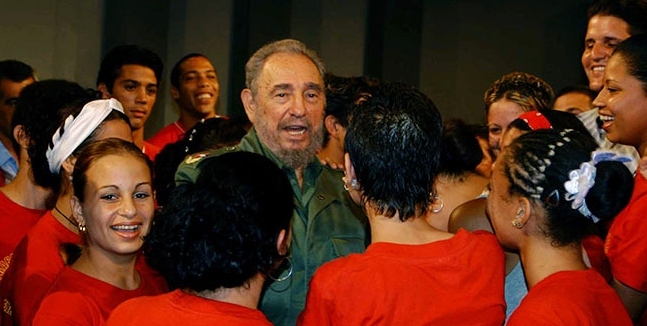
Fidel pictured among the youth, September 12, 2004.

Always Fidel
- Ciro Pérez Hebra -
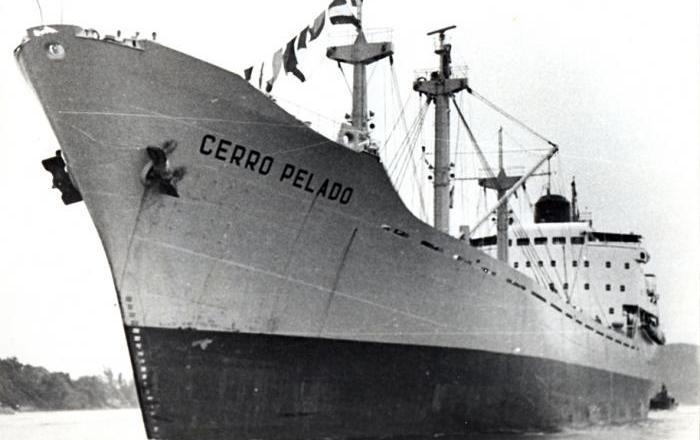
Cerro Pelado, the
ship which carried Cuban athletes to the 10th Central
American and
Caribbean Games in San Juan, Puerto Rico in 1966.
This story began months before the 10th Central
American
and Caribbean Games in San Juan, Puerto Rico in 1966, when the
President of Cuba's Olympic Committee, Manuel González Guerra,
was informed by the United States State Department that visas for
Cuban athletes to participate in the event could not be processed
by the Swiss embassy in Havana.
Avery Brundage, President of the International Olympic
Committee (IOC); General José Jesús Clark Flores
member from
Mexico; and Felicio Torregrosa, President of the Committee in
Puerto Rico discussed the situation and demanded that U.S.
authorities approve the visas, but the promised response did not
arrive from the State Department. General Clark Flores insisted
that Puerto Rico's Olympic endorsement would be withdrawn if
Cuba's participation in the Games was not resolved.
State Department director for Caribbean and Mexican
Affairs
Allen Stewart responded that the athlete's visas would be
processed in the U.S. embassy in Mexico, and the IOC recommended
that Cuba's Olympic Committee accept the proposal. The process
was initiated, but 10 days before the Games were to take place,
the State Department announced that visas would not be awarded,
that the athletes' passports would be given a special stamp, and
it also denied permission for Cubana Airlines craft to land in San
Juan.
The Cuban Olympic Committee denounced this aggression
and
demanded respect for international norms and regulations
governing the organization of regional multi-event games. Our
right to participate in the Central American and Caribbean Games
was defended.
In this situation, the heroic events surrounding the
ship Cerro Pelado emerged, June 7, 1966, demonstrating
the
fighting spirit and commitment of the country's nascent sports
movement. With characteristic speed and discretion Commander in
Chief Fidel Castro Ruz conceptualized, ordered and directed the
battle.
In Santiago de Cuba, the merchant ship was prepared
with
great care and equipped for the voyage to San Juan, with basic
accommodations for the Cuban athletes. The reconditioning
included dormitories, a kitchen, massage and dining halls, plus
areas for rest and relaxation. Set to travel aboard the ship were
the 365 members of Cuba's delegation -- athletes, coaches,
medical staff, sports leaders, and journalists.
Participants today recall much of this as surprising.
The
days leading up to the Games had been busy ones for those
organizing the delegation's participation in San Juan, but many
of us were not aware of the details.
The entire group departed from Havana's José
Martí
International Airport on the Cubana planes we thought would take
us to Puerto Rico, but we landed first in Camagüey and then in
Santiago de Cuba. Here we learned that the rest of the trip would
not be by air, but by sea. From this heroic city we cast off on
the Cerro Pelado, with the valuable "cargo" in the hands
of a first class crew led by Captain Onelio Pino.
After many hours at sea, drawing close to the shores of
Puerto Rico, with athletes exercising and training on deck, a
U.S. Coast Guard plane approached the ship flying low, and
dropped a note saying that our entry into U.S. territorial
waters, San Juan, or Puerto Rico was prohibited. Filmmaker
Santiago Álvarez from the Cuban Film Institute (ICAIC) recovered
the note, and cameraman Iván Nápoles, filmed the plane's
swoop
over the ship to preserve the memory for all time.
Before arriving, assembled on the ship's deck, we
unanimously
approved the Declaration of Cerro Pelado that outlined the
current and future principles of Cuban sports. After it was read
aloud by José Llanusa Gobel, director of the Institute of
Sports,
Recreation and Physical Education (INDER).
Three miles from San Juan on June 10, General Clark
Flores
and Puerto Rican sports leader Germán Rieckehoff Sampayo boarded
the ship, and met with José Llanusa Gobel, head of the
delegation, and Manuel González Guerra, President of the Cuban
Olympic Committee, to make the necessary logistical arrangements
for the delegation's landing. It was a difficult and dangerous
operation; the sharks were circling. The ladder of private ship Reacok
touched the Cerro Pelado; 100 persons
went
down the ladder.
We barely arrived in time at Hiram Bithorn Stadium
where the
inauguration was set to take place. We paraded and the Puerto
Rican people greeted us with applause and a group of friends
chanted in solidarity, "Cuba, Cuba, Cuba!" The press gave our
arrival significant coverage, and the landing was broadcast live
on radio.
Despite the difficulties, the Cuban delegation
performed with
dignity and determination, winning 77 medals -- 34 gold, 20 silver,
and 23 bronze -- to take second place in the medal count.
A group of enemies of the Revolution physically
attacked and
verbally insulted our delegation, but they were never able to
undermine the principles, integrity, or dignity of our
people.
The return trip to Cuba began. The first several hours
at sea
went by as we conversed happily on deck. Friend and broadcast
announcer Eddy Martin said to me, "What a delegation!" Granma
reporter Juan Marrero commented, "A performance
that met the demands," and Llanusa Gobel concluded, "A happy
ending!"
|
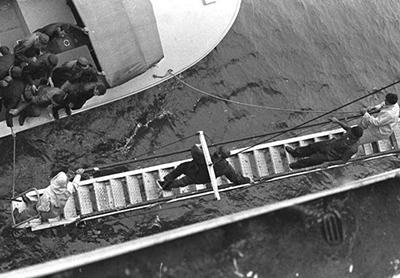
Fidel boards the Cerro Pelado.
|
We were drawing close to the Santiago de Cuba coast and
I
remember, 50 years ago, a small boat approached the Cerro
Pelado. The ladder was placed at the ship's side, and with a
strong wind gusting, Fidel climbed up, wearing a raincoat,
accompanied by other leaders of the Revolution. The emotion
brought tears to my eyes, which blended with the rain on my
face.
The Commander in Chief greeted us all and said, "I am
very
proud of your revolutionary attitude and athletic performance,"
adding, "The homeland salutes your loyalty and
determination."
Later would come the events and official reception,
June 29,
1966, when Fidel spoke and asked, "Why try to prevent the
participation of a country where sports is no longer a privilege
for the rich, exploiting few, where sports activity is not only
for the children of the rich?..."
He went on to say, "With this event, the Revolution has
won
one more battle against imperialism." He continued, "What the Cuban
Olympic Committee did was denounce the U.S. government's
coercion, demanding conditions of a political order that had
nothing to do with sports, to allow the presence of Cuba in their
colony, Puerto Rico."
At another point during his talk, he said, "Very few
times,
perhaps never before in any Central American event, has a
delegation, such a large number of athletes from the same
country, won so many medals." He emphasized, "Perhaps no other
delegation from our homeland merits so much gratitude, for the
battle waged, for the victories won at the most difficult
moments, for the dignity shown at all times."
The Cerro Pelado feat again demonstrated how
Fidel was
always with us, and has accompanied us to victory.
Ciro Pérez Hebra is a journalist and was
member of Cuba's
delegation to the 10th Central American and Caribbean Games in
San Juan, Puerto Rico.

PREVIOUS
ISSUES | HOME
Website: www.cpcml.ca
Email: editor@cpcml.ca
|













































 Renowned researcher Julia
Sweig speaking during a panel dedicated to Fidel. On the left are
activist Gail Walker and Cuban Ambassador to the United States
José Ramón
Cabañas; on the right is
Cuban-American lawyer José Pertierra.
Renowned researcher Julia
Sweig speaking during a panel dedicated to Fidel. On the left are
activist Gail Walker and Cuban Ambassador to the United States
José Ramón
Cabañas; on the right is
Cuban-American lawyer José Pertierra. 










